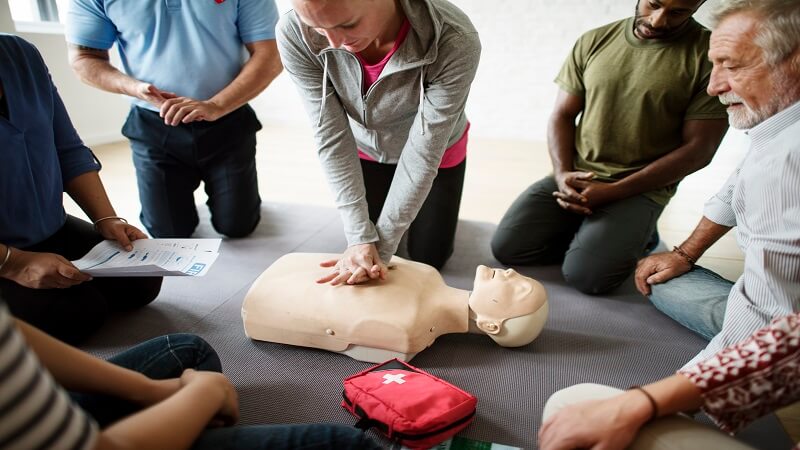In times of emergency, possessing the knowledge and skills to administer immediate aid can make all the difference between life and death. First Aid and Cardio Pulmonary Resuscitation (CPR) training equips individuals with the necessary techniques to respond effectively to various medical emergencies, from minor injuries to critical situations.
Importance of First Aid and CPR Training
The significance of first aid and CPR training cannot be overstated. It empowers individuals to act swiftly and confidently during emergencies, potentially saving lives and minimizing the severity of injuries. These skills are invaluable in both professional and personal settings, contributing to safer environments and enhanced community resilience.
Overview of Calgary’s Comprehensive First Aid and CPR Training Program
Calgary’s comprehensive training program offers a structured curriculum designed to impart essential life-saving skills to participants. Led by experienced instructors, the program covers a wide range of topics, ensuring comprehensive knowledge and practical proficiency.
Curriculum of the Training Program
Basic First Aid Techniques
Participants learn fundamental first aid techniques, including wound care, bandaging, splinting, and managing shock. These skills are essential for providing immediate assistance until professional medical help arrives.
Cardio Pulmonary Resuscitation (CPR)
CPR training focuses on techniques for administering chest compressions and rescue breaths to individuals experiencing cardiac arrest. Participants learn how to recognize the signs of cardiac arrest and perform CPR effectively to maintain blood circulation and oxygenation.
Advanced First Aid Procedures
The program also includes training in advanced first aid procedures, such as assessing and managing airway obstructions, controlling bleeding, and providing care for various medical emergencies, such as seizures and allergic reactions.
Benefits of Acquiring First Aid and CPR Skills
Acquiring first aid and CPR skills offers numerous benefits, both for individuals and their communities. These skills instill confidence, promote safety awareness, and foster a culture of preparedness. Additionally, trained individuals can respond promptly to emergencies, potentially saving lives and reducing the impact of injuries.
Accessibility and Availability of Training in Calgary
Calgary’s comprehensive training program is accessible to individuals of all backgrounds and experience levels. Classes are offered at convenient locations throughout the city, with flexible scheduling options to accommodate diverse needs and preferences.
Importance of Accredited Training Programs
Accredited training programs adhere to established standards and guidelines, ensuring the quality and reliability of instruction. Participants can trust that accredited courses provide up-to-date information and practical training that aligns with best practices in first aid and CPR.
Real-Life Scenarios and Case Studies
The training program incorporates real-life scenarios and case studies to enhance learning and skill retention. By simulating emergency situations, participants gain valuable hands-on experience and learn how to apply their knowledge in practical contexts.
Certification and Renewal Process
Upon completion of the training program, participants receive certification demonstrating their proficiency in first aid and CPR. Certifications typically require renewal every few years to ensure that individuals remain current with evolving guidelines and techniques.
First Aid and CPR Training for Different Settings
Workplace Safety
Employers often provide first aid and CPR training to employees to promote workplace safety and compliance with occupational health regulations. Trained employees can respond effectively to workplace injuries and medical emergencies, minimizing downtime and ensuring a safe work environment.
Community Settings
First aid and CPR training are valuable assets in community settings, such as schools, recreational facilities, and public events. Trained individuals can assist in emergencies that occur outside of formal healthcare settings, contributing to public safety and well-being.
Home Environments
Families and households benefit from having members trained in first aid and CPR. In-home emergencies, such as accidents and sudden illnesses, trained individuals can provide immediate assistance until professional medical help arrives, potentially preventing further harm and expediting recovery.
Role of First Aid and CPR in Emergency Situations
First aid and CPR play a critical role in emergency situations, providing vital support until advanced medical care is available. By initiating timely interventions, trained individuals can improve outcomes for patients and increase the likelihood of survival.
Testimonials and Success Stories
Participants of Calgary’s comprehensive training program have shared numerous testimonials and success stories highlighting the effectiveness of the skills they acquired. From saving lives to responding confidently in crisis situations, these accounts underscore the value of first aid and CPR training.
Continuous Learning and Skill Enhancement
Learning is a lifelong journey, and ongoing training and skill enhancement are essential for maintaining proficiency in first aid and CPR. Calgary’s training program offers opportunities for continuous learning and skill development, ensuring that participants remain prepared to respond effectively to emergencies.
Conclusion
Calgary’s comprehensive first aid and CPR training program equip individuals with essential life-saving skills that are invaluable in times of need. By investing in training and preparedness, individuals and communities can create safer environments and foster a culture of resilience and support.
